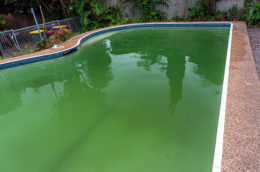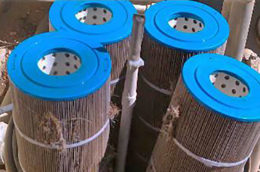
Stopping Algae: The Importance of Phosphate Prevention in Pool Water
Are you dealing with murky water and ugly algae taking over your pool? Are you losing precious swim days because you can’t enter and enjoy your pool? Ridding pools of algae takes time and money, in addition to patience. But there is a way to prevent algae in the first place.
Phosphates that accumulate in pools are food for algae, and the more phosphates that are allowed to populate your pool, the bigger the algae problem. Waiting until phosphate levels are already high to treat the issue means a cloudy, unusable pool for days. To stop phosphates before they arrive, it’s wise to PRETREAT with a phosphate remover.
Start pretreating now to avoid:
- Repeated filter cleaning
- New and recurring algae blooms
- More money spent on chemicals – especially chlorine
- More brushing and scum lines
- Cloudy post-dosing
There are two remedies to remove phosphates in pool water:
- REDUCE: Dramatically reduce the concentration of phosphates in a pool that’s already high and showing symptoms.
You need a professional grade, highly concentrated but safe formula that will immediately reduce excess phosphate levels. While dosing, water will quickly cloud up with an intensity that corresponds to the phosphate contamination.
Following up with an effective clarifier, along with a clean pool filter is the best way to clear the cloudiness and rid the pool of contamination.
- MAINTAIN: Use a maintenance-level phosphate reducer to pretreat and to keep serious problems from occurring.
For clear and phosphate-free water, maintain low phosphate conditions. Weekly dosing with a good maintenance product will keep a pool from developing common phosphate and algae problems. An excellent option will contain a broad-spectrum enzyme cocktail to destroy the organic contaminants that carry phosphates into pools.
Lo-Chlor’s formulated, high-strength specialty pool chemicals can solve your phosphate problems. Try Lo-Chlor’s Lo-Phos E+ (with enzymes) or Lo-Phos Max to get the job done.




This Post Has 0 Comments